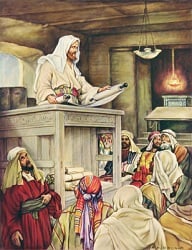Tuesday: The Example of Jesus
What does Luke 4:16 tell us about Jesus’ attitude toward the Sabbath? Why is this so important for us today? See John 14:15, 1 Pet. 2:21.
The word Luke used in verse 16, custom, comes from a Greek word related to habits constant in time and practice. In other words, Jesus regularly attended synagogue every Sabbath that He could. Moreover, this is so important to Luke that four times in his Gospel he mentions Jesus’ attendance at the synagogue on different Sabbaths (Luke 4:16, Lk. 4:31, Lk. 6:6, Lk. 13:10). Also, Luke specifically identifies the Sabbath as the seventh day of the week (Luke 23:54-24:1). The fact that Jesus Christ, during His earthly ministry, observed the seventh-day Sabbath, along with the Jews, testifies that the weekly cycle had not been lost since the giving of the law at Sinai, or even since creation. His example as an observer of the Sabbath is a model for Christians to follow, in both time and manner of observance.
What did Jesus read on that special occasion in the synagogue? Why is this significant? See Luke 4:16-21.
This wasn’t the first time Jesus read and spoke at a synagogue. More than a year had already gone by since He was baptized in the Jordan River. However, this was Jesus’ first visit to Nazareth after leaving the carpenter shop, where He spent the first 30 years of His life and where He attended the local synagogue. During His youth, often in the synagogue on the Sabbath day He was called upon to read the lesson from the prophets, and the hearts of the hearers thrilled as a new light shone out from the familiar words of the sacred text.
— Ellen G. White, The Desire of Ages, p. 74.
But this time it was different. Jesus selected a particular passage, Isaiah 61:1-2, a text that explains the Messiah’s work on earth and how He will come to proclaim the acceptable year of the Lord
(Luke 4:19, NKJV). That was the Sabbatical, or jubilee, year, a time of rest. Appropriately, Jesus chose the day of rest, the Sabbath, to announce His ministry of redemption, liberation, and healing. Truly, we find rest in Jesus, a rest expressed in a tangible way every Sabbath day.


Jesus used the holy rest to proclaim the good news of the gospel of redemption,liberation and healing to His congregation.This reminds us that our sabbath rest should not be an idle rest but rather an opportunity to share the good news,the story of our redemption.
Also let us not forget that it wasn’t just for witnessing but for lifting burdens as well.
I find a couple of things that are interesting about this lesson. The first is that Luke was a gentile and not a Jew like the other Gospel writers were so when the lesson makes the comment. “Moreover, this is so important to Luke that four times in his Gospel he mentions Jesus’ attendance at the synagogue on different Sabbaths” it is significant. In fact, one would think that Matthew would be the one that mentions Jesus’ attendance in the synagogue more than anyone else since his Gospel was written primarily for the Jews but that is not the case since he only mentions it two times. Also Luke is the only writer that makes sure that the one he is writing to, Theophilus (Lk 1:3), knows that it was one of the Ten Commandments that he was talking about rather than just one of the other many sabbath days that were part of a ceremonial feast or even one of the pagan days of worship. The other writers seem to either assume that their audience knows that or to them that fact wasn’t that important.
The other thing is that while most theologians agree that Lk 4:16-21 was probably during a jubilee year where in the synagogue it was customary to read Isa 61. What is strange is that Jesus truncates that normal reading for He stops just short of the part of verse 2 that says, “And the day of vengeance of our God” (Isa 61:2 NKJV) which I believe is the thing that got everyone’s attention. Doing that was in full accord with His teaching against revenge.
I really enjoyed reading today’s lesson as it sheds light into the importance of keeping the Sabbath. As a fairly new Seventh Day Adventist and a mother, I thank God for His word, and Jesus’ example for us to follow. I pray for all Christians, especially parents, so that we may maintain the custom of observing the Sabbath according to God’s will so that our children may do the same.
Keeping the Sabbath was very important to Jesus because he wanted to leave it as an example to us so that we too would follow him and keep the Sabbath when he was gone back to heaven.
In today’s study, Jesus chose to read Isaiah 61: 1-2 stopping in the middle of verse 2 just before ”and the day of his wrath to their enemies”.He did this because the time of God’s blessings is fulfilled in Jesus’ first coming, but the time of Go’s wrath awaits His Second Coming.His hearers were expecting just the opposite of the Messiah; they thought He would crush their enemies first and then usher in God’s blessings.To know Christ is to know the truth which the world needs today.Keeping Sabbath lessens also our burdens!